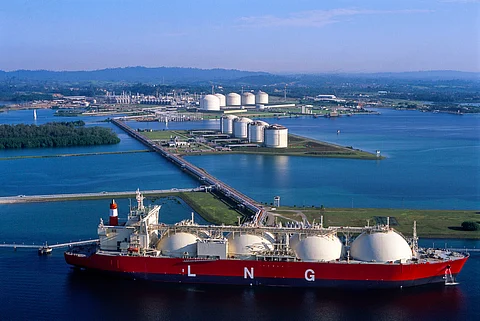

Just a day after categorically rejecting the Energy East oil pipeline, Quebec is now rethinking its stance on a liquefied natural gas (LNG) pipeline from Western Canada thanks to economic uncertainty and trade tensions with the US.
That’s because the government of Quebec Premier François Legault, which scrapped the LNG-Québec project in 2021 due to environmental concerns, is now signalling a willingness to reconsider it. Environment Minister Benoit Charette made it clear on Wednesday, however, that any revival would have to meet the “stringent environmental criteria” that led to its rejection in the first place.
“We’re not opposed to energy products that respect the environmental criteria,” Charette told reporters at the National Assembly. He also warned that if the project remains unchanged, the decision to reject it would stand.
The sudden openness to an LNG pipeline stands in stark contrast to Quebec’s staunch opposition to the Energy East oil pipeline, which was proposed by TransCanada (now TC Energy) and cancelled in 2017.
Yet now, with potential US tariffs looming and pressure to diversify energy exports beyond a single American customer, the Quebec government is once again entertaining the idea of an LNG pipeline. Unlike crude oil, LNG has been framed as a cleaner fossil fuel that could help supply European markets looking to move away from Russian gas.
Federal Foreign Affairs Minister Melanie Joly hinted that the project could be key to breaking Canada’s dependence on the US for energy sales.
“Canada has essentially one client. For Alberta oil, 98% of the oil goes to the US but we don’t currently have pipelines that cross Canada to come to Quebec,” she said at a recent Chamber of Commerce event in Montreal.
Conservative Party leader Pierre Poilievre has also voiced support, arguing that exporting LNG to Europe could fetch prices 200-300% higher than the US.
The original LNG-Québec project would have involved building a 780-kilometre pipeline from northern Ontario to Saguenay, where natural gas from Alberta and BC would be liquefied and shipped overseas.
But the the Quebec environmental review department concluded that increased tanker traffic in the Saguenay River could threaten beluga whale populations and contribute to higher greenhouse gas emissions. Public opposition was also fierce, leading the Quebec government to ultimately reject the plan.
Despite the renewed discussion, skepticism remains.
“We had a big debate on that project already, and it wasn’t determined that it was in Quebec’s economic interests at the time,” said Parti Québecois MNA Pascal Paradis. “Those two questions are still there.”
Meanwhile, Quebec Conservative Party leader Éric Duhaime has called for not just an LNG revival, but also the construction of new oil pipelines in the province.
Observers said Quebec’s willingness to entertain an LNG pipeline while remaining firmly opposed to oil pipelines underscores the province’s balancing act between economic pragmatism and environmental politics.
With energy exports becoming a flashpoint in Canada-US relations, the province now faces a tough choice: stick with its climate commitments, or make room for a project it once rejected in the name of economic security.
“It’s a question people have to ask themselves here,” Joly said. “At the same time, we have environmental objectives. We have to reduce our C02 emissions. I’m very, very interested to know: Does what’s happened in the last few days change the game?”
